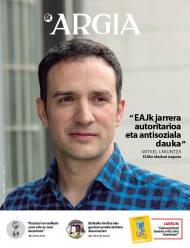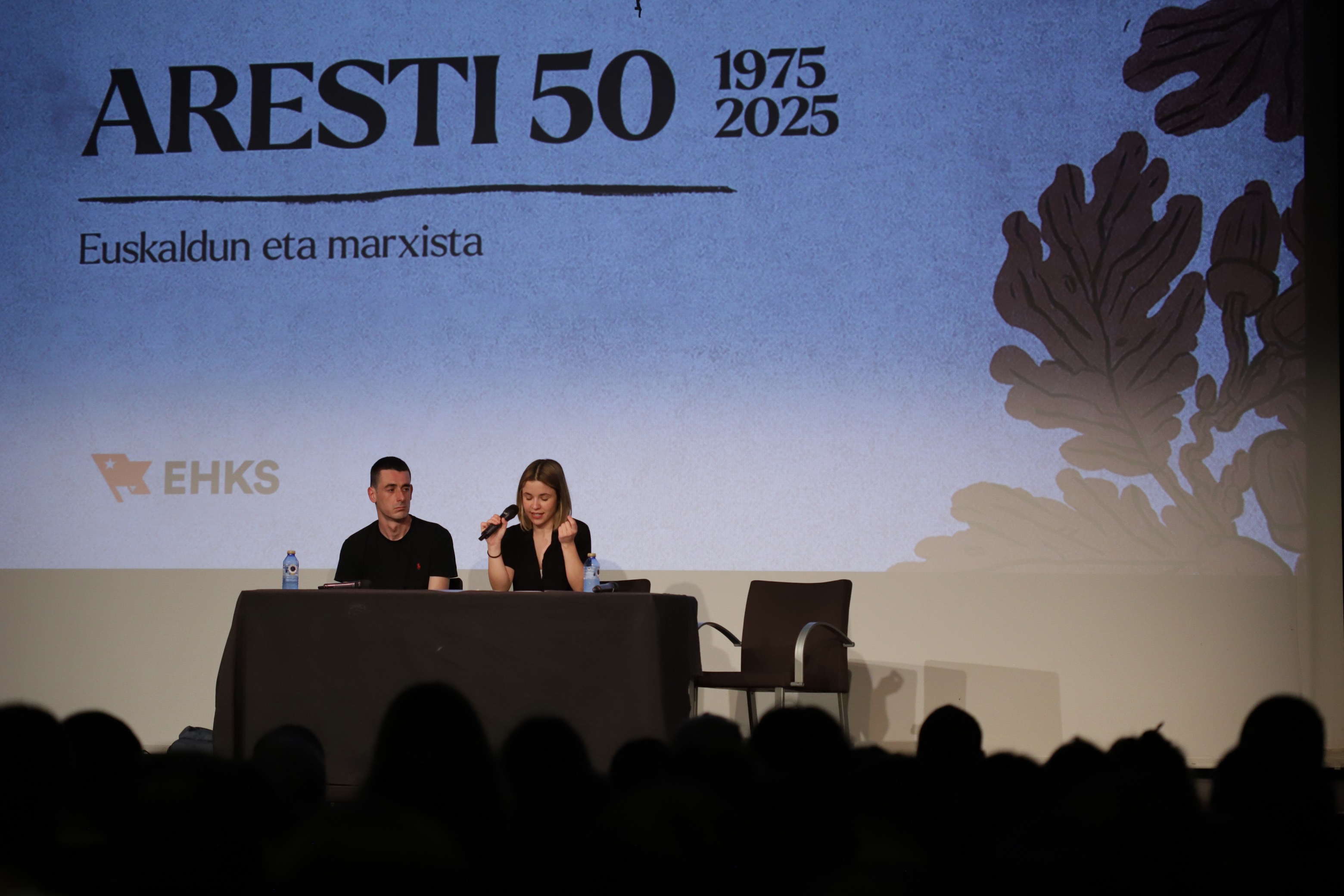"I wasn't in the literature, so who was I? This emptiness made me sad.
- Garazi Albizua (Santurtzi, 1985) is a writer and writer. How do turtles do it? Author of (2015, Denonartean) and Kemena (2018, Denonartean), Ahire Mundua is currently working on science fiction trilogy. His first chapter, Izadia (2018, Denonartean), is already on the street. In addition to writing, he also runs workshops and courses.

He has just published the novel Izadia. What is it about?
Nature is the name of a city where there is a lot of hardness, oppression and sexism. To cope with this, several individuals will meet at the Main Theatre in Vitoria-Gasteiz, and special connections will be established between them.
Work is part of a trilogy.
Yeah, in every book, I looked at one thing. Perhaps the first is the most exhilarating, because it has violence. If in the second, the reader already knows this violence, he will focus on another issue and the third, on it. Despite touching the edges of the same subjects, after all, in the three books.
Who is the protagonist?
There are many protagonists, and the chapters bear their names. By chapters, the reality of each character is explained from their point of view. There is a kind of leader, but as they are necessary to carry out their actions, the leading role is more divided. However, Katixa would be the main character.
I know you missed the women in the books as little as you missed them.
As I liked reading, I was looking for references in reading, as well as information on how to act in the face of my problems. But because the characters I found were men, I didn't find what I needed. In that sense, there are many women in my work. I've had the intention of making people visible with diverse identities.
Science fiction is a fertile land for that purpose.
Yes, that's a perfect gender. Very quiet too. Because I start investing everything that happens to me on paper, and for example, I can invent a device, what it does I don't know what, and what I just know is what. I don't know how to explain it to you.
Are you a science fiction fan from a young age? .jpg)
I read fantasy more than science fiction. The first book I read was The Witch, my aunt gave it to me. Until then, I had read comics. With that I premiered in fantasy and it was a great discovery to meet a female protagonist, as in comics men were the protagonists. As I delved into the fantasy world, I saw that there were not many other protagonists. For a long time I felt the need for that reference.
How do you remember that feeling of lack of referents?
Sadness. I remember that in adolescence, when you're sadder than usual, you felt a void. I liked reading, but I saw that there was a leap between my reality and that of the book. I wasn't in the literature, so who was I? This emptiness made me sad.
You conduct the literary groups of Santurtzi and Erandio and the workshop of creating the Louise Michel library of Bilbao.
I love the workshops and the process of preparing them. The collection of information learns a great deal, although it is often also a very sad job. Because you see how difficult it is to find something written by women, without the need to step back too far in time. And in the writings you received you see what the situations they lived: many committed suicide, suffered a lot of violence, they were lives full of brutality… However, I really like to explain their lives in class, I enjoy the workshops. In addition, there is always someone who knows and adds something, and then a kind of community emerges.
You also run workshops in women's houses. You've also focused your activity on empowerment.
In some of the literary works you read, you also find those lived by you. If you are with other women and the experiences of each one are counted out loud, the feeling, the fraternity, that you are not only emerging. It's beautiful!
Women's writings have an important weight in your life.
I saw that most of the books I had read were from men, and I began to read only works written by women. So I've been around for a few years, and I think I'm missing others to balance the balance.
In literature, it's not the same to be a writer as a man or a woman.
The issue of lack of visibility generates frustration, as several authors point out. Needless to say, it would hamper the job of writing. As Virginia Woolf claimed, profit and space are essential. But above all, lack of presence generates a kind of frustration that has nothing to do with being famous.
With a minimum declaration?
Yes. I look for women's papers in small publishers. And how difficult it is! Finding writing jobs requires work, and that creates frustration. The profession of writer has sad things, but, as it is well worth it, I keep writing.
writer “Being a great reader, I set myself the challenge of ever being a writer. I immediately realized that what I was writing didn't have the rhythm, the charm or the intonation of what I was saying. He clumsily faltered the letters. I changed my chip and started going into the novels of female writers, and my voice, which was strange to me, took a different look. I found the writer reading the literary works of others, and I write from there.”
Now that everyone has become more Franciscan than the Pope, it’s worth remembering our unsurpassed classics. There was one in the 17th century, his grace was Arnaut Oienart. And since we can’t immerse ourselves in all his works, today we will praise O.ten youth in... [+]
Aurreko tertuliako galderari erantzuteko beste modu bat izan zitekeen, akaso modu inplizituago batean, bigarren solasaldi honetako izenburua. Figura literarioaz gaindi, pertsonaia zalantzan jartzeko, edo, kontrara, pertsonaiaren testuingurua ulertzeko saiakera bat. Santi... [+]
Astelehen honetan hasita, astebetez, Jon Miranderen obra izango dute aztergai: besteren artean, Mirande nor zen argitzeaz eta errepasatzeaz gain, bere figurarekin zer egin hausnartuko dute, polemikoak baitira bere hainbat adierazpen eta testu.
Martxoaren 17an hasi eta hila bukatu bitartean, Literatura Plazara jaialdia egingo da Oiartzunen. Hirugarren urtez antolatu du egitasmoa 1545 argitaletxeak, bigarrenez bi asteko formatuan. "Literaturak plaza hartzea nahi dugu, partekatzen dugun zaletasuna ageri-agerian... [+]
1984an ‘Bizitza Nola Badoan’ lehen poema liburua (Maiatz) argitaratu zuenetik hainbat poema-liburu, narrazio eta eleberri argitaratu ditu Itxaro Borda idazleak. 2024an argitaratu zuen azken lana, ‘Itzalen tektonika’ (SUSA), eta egunero zutabea idazten du... [+]























